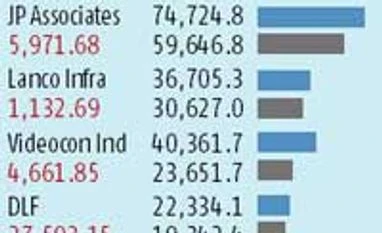But an analysis of their financials shows the indebtedness of most of these companies remains high even at reduced debt levels, and their market value remains much lower than their debt. These make it tough for them - if not impossible - to raise fresh equity for retiring debt or fund expansion.
The only exception seems to be real estate developer DLF, whose market value remains well above its debt, after the planned divestment of four housing projects to private equity firms. This gives the real estate major the ability to access the capital market to raise fresh equity.
Jaiprakash Associates' consolidated debt, including deferred tax liability, is likely to decline by a quarter to around Rs 60,000 crore at the end of 2014-15, thanks to a sell-off of its hydropower assets to JSW Energy and part of its cement assets to the Aditya Birla group. The cash infusion thereby is estimated to reduce its debt-to-equity ratio to 5.8 from the earlier 7.3. But even at a lower level, the company will be one of the most indebted in its peer group.
The calculation is based on the assumption that these companies will use the entire divestment proceeds to retire debt and there is no fresh rise in debt in 2014-15.
Analysts also worry about the divestment impact on the company's operations and cash flows going forward. "Cement and hydropower are cash-rich businesses with small incremental investment in capex and working capital. Their sell-off is likely to adversely affect the company's cash flows, as other businesses like real estate and construction & infra are working capital-intensive," says a senior analyst with a bank who does not wish to be named.
Videocon, for example, exited from its oil & gas business in Mozambique. Similarly, wind power equipment maker Suzlon exited from Senvion, which was one the most profitable assets in its portfolio and accounted for nearly two-thirds of its consolidated global revenues. Suzlon promoters also sold part of their stake to the family of Sun Pharma founder Dilip Shanghvi, to help reduce the company's debt.
Experts say distress sale of assets by companies increased in 2014-15, mainly due to pressure from banks, which were caught holding the can as companies defaulted on loans or sought repayment moratorium waiver under corporate debt restructuring schemes. Some, such as Kingfisher Airlines, simply did not pay up.
"The asset sales are brought about by the current adverse business conditions, where promoters are seeing these businesses as unviable. Often, companies either bought businesses in the name of diversification or started fresh in these areas. Now, they are selling these assets both locally and globally," says D R Dogra, chief executive & managing director of CARE Ratings.
"This might carry on for some more time and we could see consolidation through asset sales in the coming year as well, as companies try to get back on their feet," he adds.
While a string of asset sales happened in India, some like Bharti Airtel also sold assets abroad. It sold its telecom tower business in Africa for $1.05 billion in November last year to American Towers Company. The proceeds are to be used for repaying the loans that the company took to fund its $9-billion takeover of an African wireless company in 2010.
Similarly, in October last year, Tata Steel announced it wanted to sell its long products division in Europe; Swiss firm Klesch is conducting due diligence. The transaction has not yet been closed. Tata Steel sold a land parcel in Mumbai for Rs 1,000 crore but, given the level of its overall debt, the company might still not be out of the woods.
)